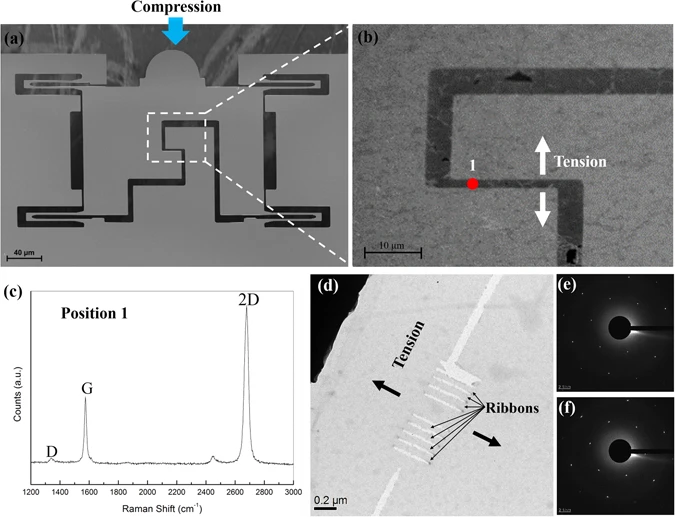The mechanical response of patterned graphene nanoribbons (GNRs) with a width less than 100 nm was studied in-situ using quantitative tensile testing in a transmission electron microscope (TEM). A high degree of crystallinity was confirmed for patterned nanoribbons before and after the in-situ experiment by selected area electron diffraction (SAED) patterns. However, the maximum local true strain of the nanoribbons was determined to be only about 3%. The simultaneously recorded low-loss electron energy loss spectrum (EELS) on the stretched nanoribbons did not reveal any bandgap opening. Density Functional Based Tight Binding (DFTB) simulation was conducted to predict a feasible bandgap opening as a function of width in GNRs at low strain. The bandgap of unstrained armchair graphene nanoribbons (AGNRs) vanished for a width of about 14.75 nm, and this critical width was reduced to 11.21 nm for a strain level of 2.2%. The measured low tensile failure strain may limit the practical capability of tuning the bandgap of patterned graphene nanostructures by strain engineering, and therefore, it should be considered in bandgap design for graphene-based electronic devices by strain engineering.

The mechanical response of patterned graphene nanoribbons (GNRs) with a width less than 100 nm was studied in-situ using quantitative tensile testing in a transmission electron microscope (TEM). A high degree of crystallinity was confirmed for patterned nanoribbons before and after the in-situ experiment by selected area electron diffraction (SAED) patterns. However, the maximum local true strain of the nanoribbons was determined to be only about 3%. The simultaneously recorded low-loss electron energy loss spectrum (EELS) on the stretched nanoribbons did not reveal any bandgap opening. Density Functional Based Tight Binding (DFTB) simulation was conducted to predict a feasible bandgap opening as a function of width in GNRs at low strain. The bandgap of unstrained armchair graphene nanoribbons (AGNRs) vanished for a width of about 14.75 nm, and this critical width was reduced to 11.21 nm for a strain level of 2.2%. The measured low tensile failure strain may limit the practical capability of tuning the bandgap of patterned graphene nanostructures by strain engineering, and therefore, it should be considered in bandgap design for graphene-based electronic devices by strain engineering.
